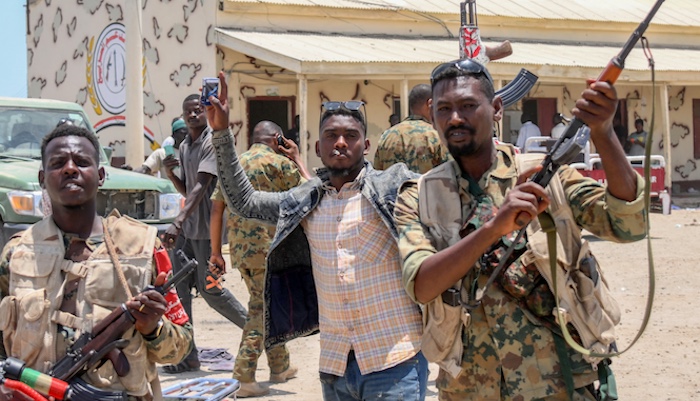
In the escalating conflict, Sudanese paramilitary fighters loot homes and seize hospitals
In the midst of the greatest displacement crisis in history, paramilitary fighters have seized control of a hospital and ransacked homes, intensifying the conflict in Sudan.
In the Sennar area, the Rapid Support Forces (RSF) have begun an operation against the Sudanese military. After assaulting the settlement of Jebal Moya, they moved on to Singa, the province capital, where more fighting broke out. The United Nations estimates that 57,000 people left their homes as a result of the violence.
Residents of a central city said on Sunday that fighters from a known paramilitary group in Sudan had looted homes, shops, and the main hospital, forcing tens of thousands of people to flee. This represents a fresh turn in the 14-month conflict that is driving Sudan closer to starvation.
Over the weekend, RSF fighters in pickup trucks equipped with automatic guns went on a rampage across Singa, according to reports from local rights groups and residents. They overran the city’s primary hospital and ransacked homes and stores in the neighborhood market.
The RSF declared in a statement on Saturday that it has taken control of the 17th Infantry Division Headquarters, which is the key military institution located in Singa. The RSF reportedly penetrated the military’s defenses, according to local media as well.
A spokesman for the Sudanese military, Brigadier Nabil Abdalla, asserted that the military had retaken control of the facility. Fighting was still going on as of Sunday am, although neither assertion could be independently confirmed.
Since the crisis broke out in April of last year, the paramilitary RSF has been the target of multiple accusations of grave violations of human rights throughout Sudan. The United Nations reports that the conflict has led in nearly 14,000 deaths and 33,000 injuries; however, rights groups fear the real toll may be much higher.
The RSF’s seizure of Singa could have serious humanitarian repercussions, experts and rights activists from the Sudan Conflict Monitor warned. It could also cause major disruptions to large-scale agricultural programs in neighboring provinces like Blue Nile, White Nile, and Jazira, which were once Sudan’s agricultural heartland.
According to a report released on Sunday by the International Organization for Migration, the fighting caused over 55,440 people to be displaced from Singa and its surrounding communities, and 1,455 more people to evacuate Jebal Moya.
They said that the circumstances are still quite unstable and uncertain.
People spoke of the RSF fighters’ rampant looting in Singa, where they took cell phones, jewelry, private cars, and other valuables. There have been reports of numerous locals being killed, injured, or imprisoned during the unrest.
“They seemed to enjoy their activities in Khartoum and other cities,” stated Abdel-Rahman al-Taj, a native of Singa who escaped to the Blue Nile area on Saturday. “Many individuals were slain, injured, or imprisoned.”
The RSF allegedly invaded Singa Educational Hospital, holding scores of patients and medical personnel as “human shields,” according to the Sennar Observatory for Human Rights, a local human rights organization. The fighters violated international human material law by converting the hospital into a military facility.
Hospital doctors reported that RSF fighters, some of whom were in trucks, crowded the courtyard and hallways of the building. “It’s a very dangerous situation,” the doctor stated, speaking under anonymity to protect himself. “We have to work at gunpoint.”
Requests for comments were not immediately answered by the RSF.
Sennar’s struggle is taking place in the meantime, while the world’s attention has been drawn to al-Fasher, a significant Darfuri city under RSF siege for months in an effort to seize military control. The military’s final foothold in Darfur is Al-Fasher.
With nearly 11 million people displaced, the conflict in Sudan is the primary cause of the biggest displacement crisis in history. With 8.5 million people enduring significant food insecurity and 755,000 people anticipating catastrophic food shortages in the upcoming months, international experts have warned of an imminent famine.
Reports of rampant sexual abuse and other atrocities have dogged the battle, especially in Darfur, which went through a genocide in the early 2000s. Human rights organizations have labeled these actions as crimes against humanity and war crimes.
All Categories
Recent Posts
Tags
+13162993331
zoneyetu@yahoo.com



